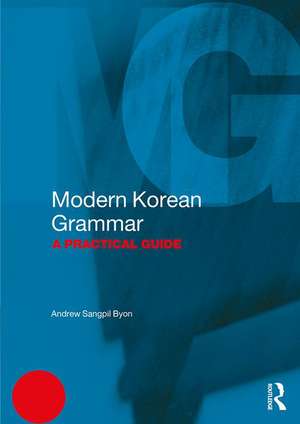Modern Korean Grammar: A Practical Guide: Modern Grammars
Autor Andrew Byonen Limba Engleză Paperback – 20 iun 2017
| Toate formatele și edițiile | Preț | Express |
|---|---|---|
| Paperback (1) | 380.29 lei 3-5 săpt. | +48.08 lei 7-13 zile |
| Taylor & Francis – 20 iun 2017 | 380.29 lei 3-5 săpt. | +48.08 lei 7-13 zile |
| Hardback (1) | 853.45 lei 6-8 săpt. | |
| Taylor & Francis – 14 iun 2017 | 853.45 lei 6-8 săpt. |
Din seria Modern Grammars
-
 Preț: 379.39 lei
Preț: 379.39 lei -
 Preț: 409.31 lei
Preț: 409.31 lei -
 Preț: 401.30 lei
Preț: 401.30 lei -
 Preț: 414.90 lei
Preț: 414.90 lei -
 Preț: 387.82 lei
Preț: 387.82 lei -
 Preț: 418.50 lei
Preț: 418.50 lei -
 Preț: 322.34 lei
Preț: 322.34 lei -
 Preț: 370.86 lei
Preț: 370.86 lei -
 Preț: 335.15 lei
Preț: 335.15 lei - 28%
 Preț: 427.84 lei
Preț: 427.84 lei
Preț: 380.29 lei
Nou
Puncte Express: 570
Preț estimativ în valută:
72.77€ • 76.13$ • 60.45£
72.77€ • 76.13$ • 60.45£
Carte disponibilă
Livrare economică 12-26 martie
Livrare express 26 februarie-04 martie pentru 58.07 lei
Preluare comenzi: 021 569.72.76
Specificații
ISBN-13: 9781138931312
ISBN-10: 1138931314
Pagini: 366
Ilustrații: 2 Tables, black and white
Dimensiuni: 174 x 246 x 25 mm
Greutate: 0.98 kg
Ediția:1
Editura: Taylor & Francis
Colecția Routledge
Seria Modern Grammars
Locul publicării:Oxford, United Kingdom
ISBN-10: 1138931314
Pagini: 366
Ilustrații: 2 Tables, black and white
Dimensiuni: 174 x 246 x 25 mm
Greutate: 0.98 kg
Ediția:1
Editura: Taylor & Francis
Colecția Routledge
Seria Modern Grammars
Locul publicării:Oxford, United Kingdom
Cuprins
Chapter 1: Nouns Chapter 2: Pronouns Chapter 3: Numbers and Counters Chapter 4: Nominalizers Chapter 5: Case particles I Chapter 6: Case particles II Chapter 7: Special particles I Chapter 8: Special particles II Chapter 9: Verbs, adjectives, and copula Chapter 10: Irregular predicates Chapter 11: Past tense Chapter 12: Future tense and aspect Chapter 13: Auxiliary verbs I Chapter 14: Auxiliary verbs II Chapter 15: Auxiliary verbs III Chapter 16: Clausal connectives I Chapter 17: Clausal connectives II Chapter 18: Clausal connectives III Chapter 19: Clausal conjunctives IV Chapter 20: Negation Chapter 21: Modifers Chapter 22: Expressions with modifier clauses I Chapter 23: Expressions with modifier clauses II Chapter 24: Expressions with modifier clauses III Chapter 25: Sentence endings I Chapter 26: Sentence endings II Chapter 27: Addressee honorifics: Speech level endings Chapter 28: Referent honorifics Chapter 29: The passive construction Chapter 30: The causative construction Chapter 31: Direct and indirect questions/quotations Chapter 32: Prenouns Chapter 33: Adverbs Chapter 34: Ability Chapter 35: Addressing and referring to someone Chapter 36: Advice Chapter 37: Cause Chapter 38: Changes Chapter 39: Choices Chapter 40: Comparing Chapter 41: Complaints Chapter 42: Conditions Chapter 43: Congratulation, and condolence, and gratitude Chapter 44: Conjecture Chapter 45: Contrast Chapter 46: Deciding Chapter 47: Degree and extent Chapter 48: Describing people, places, and states Chapter 49: Discoveries Chapter 50: Emphasizing strategies Chapter 51: Establishing sequences Chapter 52: Experiences Chapter 53: Greeting and leave taking Chapter 54: Hypothetical situations Chapter 55: Initiating and maintaining conversation Chapter 56: Intentions and plans Chapter 57: Likes and wishes Chapter 58: Listing and including additional information Chapter 59: Location, direction, and distance Chapter 60: Means Chapter 61: Obligation and necessity Chapter 62: Permission and prohibition Chapter 63: Personal information Chapter 64: Possibility Chapter 65: Probability and inevitability Chapter 66: Purposes Chapter 67: Reasons Chapter 68: Recollecting Chapter 69: Regrets and futility Chapter 70: Requests Chapter 71: Similarity Chapter 72: Simultaneous actions Chapter 73: Softening strategies Chapter 74: Telling time, date, etc. Chapter 75: Temporal relations
Notă biografică
Andrew Sangpil Byon is Department Chair and Associate Professor of Korean Studies at the University at Albany, USA. As a Korean applied linguist, his primary research areas are sociolinguistics, Korean-as-a-foreign/second language (KFL) pedagogy, and second language acquisition (for American KFL learners).
Descriere
Routledge’s Modern Grammar series is an innovative reference guide combining traditional and function-focused grammar in a single volume, with an accompanying workbook. The aim of the Modern Korean Grammar, is to provide an overview of the structures and functions of Korean. The book combines a comprehensive description of the grammatical structures of Korean with a functional/usage approach to the language. All target grammatical and functional points will be illustrated with examples in Hangul with English translations for better understanding. In addition, the use of linguistic terminology is limited, to facilitate quick and easy comprehension.
